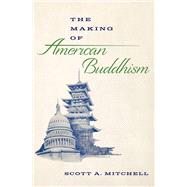The Making of American Buddhism
, by Mitchell, Scott A.- ISBN: 9780197641569 | 0197641563
- Cover: Hardcover
- Copyright: 5/30/2023
As of 2010, there were approximately 3-4 million Buddhists in the United States, and that figure is expected to grow significantly. Beyond the numbers, the influence of Buddhism can be felt throughout the culture, with many more people practicing meditation, for example, than claiming Buddhist identity. A century ago, this would have been unthinkable. So how did Buddhism come to claim such a significant place in the American cultural landscape?
The Making of American Buddhism offers an answer, showing how in the years on either side of World War II second-generation Japanese American Buddhists laid claim to an American identity inclusive of their religious identity. In the process they-and their allies-created a place for Buddhism in America. These sons and daughters of Japanese immigrants-known as “Nisei,” Japanese for “second-generation”-clustered around the Berkeley Bussei, a magazine published from 1939 to 1960. In the pages of the Bussei and elsewhere, these Nisei Buddhists argued that Buddhism was both what made them good Americans and what they had to contribute to America-a rational and scientific religion of peace.
The Making of American Buddhism also details the behind-the-scenes labor that made Buddhist modernism possible. The Bussei was one among many projects that were embedded within Japanese American Buddhist communities and connected to national and transnational networks that shaped and allowed for the spread of modernist Buddhist ideas. In creating communities, publishing magazines, and hosting scholarly conventions and translation projects, Nisei Buddhists built the religious infrastructure that allowed the later Buddhist modernists, Beat poets, and white converts who are often credited with popularizing Buddhism to flourish. Nisei activists didn't invent American Buddhism, but they made it possible.
The Making of American Buddhism offers an answer, showing how in the years on either side of World War II second-generation Japanese American Buddhists laid claim to an American identity inclusive of their religious identity. In the process they-and their allies-created a place for Buddhism in America. These sons and daughters of Japanese immigrants-known as “Nisei,” Japanese for “second-generation”-clustered around the Berkeley Bussei, a magazine published from 1939 to 1960. In the pages of the Bussei and elsewhere, these Nisei Buddhists argued that Buddhism was both what made them good Americans and what they had to contribute to America-a rational and scientific religion of peace.
The Making of American Buddhism also details the behind-the-scenes labor that made Buddhist modernism possible. The Bussei was one among many projects that were embedded within Japanese American Buddhist communities and connected to national and transnational networks that shaped and allowed for the spread of modernist Buddhist ideas. In creating communities, publishing magazines, and hosting scholarly conventions and translation projects, Nisei Buddhists built the religious infrastructure that allowed the later Buddhist modernists, Beat poets, and white converts who are often credited with popularizing Buddhism to flourish. Nisei activists didn't invent American Buddhism, but they made it possible.







